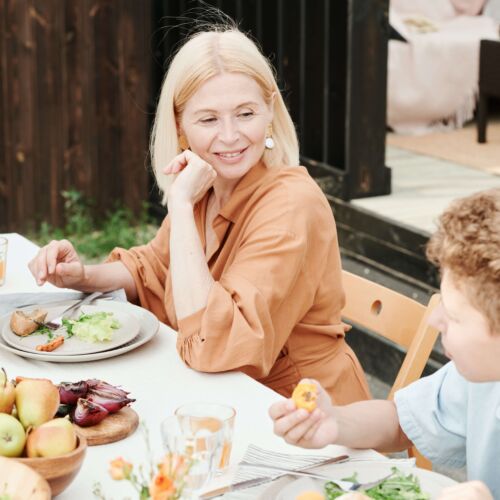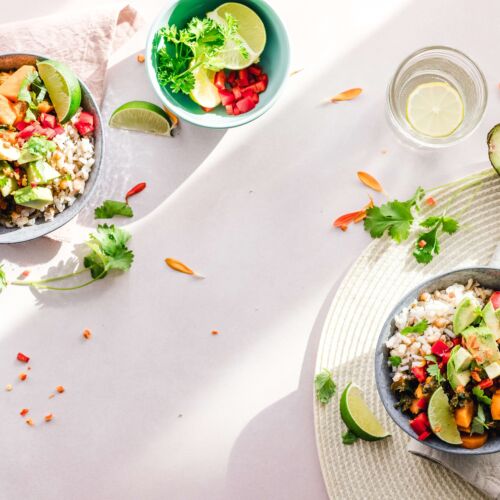What is Intuitive Eating & Why are Dietitians So Excited About It?
by Renee Little

If you haven’t heard about intuitive eating yet, you are missing out so keep reading to get all the details! Intuitive eating is a set of 10 principles created by authors Evelyn Tribole and Elsye Resch. Its intention is to help people who have dieted most of their life and want a way out of the never-ending yo-yo dieting cycle. The 4th edition of the book is underway and will be available in June 2020.
Intuitive eating offers a kind and compassionate way to approach nutrition that many dietitians can get behind.
The 10 Principles are:
1. Reject the Diet Mentality
In order to move away from the dieting cycle, it’s important to look at how it has been harmful in your life. Why would we stop doing something that worked or served us well? If you’ve been in a chronic dieting cycle, you can likely identify many reasons to step out of it.
The many reasons dieting is so negative in our lives as it:
- consumes brain space with calorie counting/food tracking/diet research
- steals the joy of connecting with and having satisfaction in food
- creates constant body dissatisfaction
- creates doubt that you can trust your body’s cues
Dieting is constantly saying “you’re not enough.” When you have an awareness of all the negative ways dieting has impacted your life, you can start to put actions in place to reject this way of living and reject the diet mentality! Once you decide to ditch dieting you can start to re-learn how to eat intuitively and respect your body.
2. Honor Your Hunger
Dieting sends the message that food restriction and being hungry is “good.” Food restriction is looked upon as “normal” in diet culture when it’s anything but normal. Listening to your hunger and feeding your body on a regular basis will feel really good and with regular meals and snacks comes a sense of ease, emotional regulation, clarity in thought and a constant energy source throughout the day.
3. Make Peace with Food
If you’ve dieted or been on a weight loss plan it’s likely you’ve felt guilt after eating certain “bad” foods. Different diets have their unique lists of foods that are considered “off limits.” If you eat these foods, then comes the guilt. The emotion of guilt can create a cycle of: food restriction -> eating “bad” foods -> feeling guilt -> trying to restrict food again.
In order to stop this cycle and instead connect to and honor the body’s cues, making peace with foods on the “bad” food list is helpful. Making peace with food involves a systematic approach to consuming the foods on your forbidden food list and de-escalating feelings of guilt or negativity towards them or yourself for eating them.
4. Challenge the Food Police
If you’ve ever had a voice in your head that’s said… “don’t eat that” or “I can’t believe you’re eating that food,” you can already understand the concept of the food police. This area of intuitive eating speaks to identifying these voices, challenging them with facts and arm yourself with new thoughts of kinder and less judgemental narratives around food.
5. Feel Your Fullness
Diet plans and programs typically will decide upon a specific portion size and frequency of meals based on your weight, height and activity level. This is an external way of eating. Intuitive eating is an internal way of eating. It involves checking in with your body and deciding for yourself the portion sizes, frequency and timing of meals. The principle of feeling your fullness explores your body’s fullness cues so that you can make your own food choices that honor your body.
6. Discover the Satisfaction Factor
Satisfaction and pleasure from food is at the core of intuitive eating. Frequently, diet plans and programs a call for low calorie foods and often dismiss the importance of having satisfying and pleasurable meals. Learning to eat intuitively involves adding an element of mindfulness at meals to explore which foods you enjoy more and how to make meals taste great again.
7. Cope with Your Emotions with Kindness
This principle has changed since the release of the last book in 1994. The principle used to be titled “cope with your emotions without using food.” This change in perspective is a testament to the research and exploration of emotional coping and food. The new Intuitive Eating book will be released in June 2020 and there will be a new perspective and research presented for this principle. Until the new book is released, know that using food to cope with emotions is entirely normal and is also unique for each person. If you are finding challenges with it, I would recommend you reach out to a Certified Intuitive Eating Counselor or Dietitian specializing in Intuitive Eating (see below for professionals near you).
8. Respect Your Body
There are unrealistic pressures to be a certain body type and shape out there in the world. This principle is all about accepting your genetic blueprint, reducing the critical narrative around your body so you can take care of it. It might not be possible to entirely love your body, but you can start to actively choose positive body talk, giving your body the basics (food,rest, care) and honor it by buying clothing that fits and feels good.
9. Movement—Feel the Difference
Do you remember as a kid that movement was directly linked to having fun? As adults somehow this concept gets lost and the purpose of exercise shifts to being centered around weight loss. This principle emphasizes the importance of making movement fun again! You can start this shift by thinking about the activities you enjoy doing and that make you mentally and physically feel good. The next step is putting more of these activities in your life and less of the arduous exercise classes you don’t enjoy and that you have to drag yourself to. Movement can be a source of joy in your life again.
10. Honor Your Health—Gentle Nutrition
The last principle is the one that focuses on incorporating foods that nourish your body without bringing back the diet mentality of “good” and “bad” foods. It might help to know that most nutrition recommendations are intended to be an average over time, not for a single meal or single day. Evelyn Tribole one of the co-authors of the book states “everytime you eat is an opportunity to get to know yourself a little better. When you eat a meal, you have an opportunity to get curious about the food and your body. You can explore how the meal made you feel physically, how satisfying it was and if you want it to be any different to support your physical and emotional wellbeing.
Why Are Alberta Dietitians Excited About Intuitive Eating?
Dietitians are excited about this approach to nutrition because dieting has failed so many people time and time again and this can create a challenging and negative relationship with food. Intuitive eating offers a framework to help individuals to repair their relationship with food and find joy in eating and movement instead of focusing on weight loss and changing their body.
Renee Little, RD, The Ambitious RD
Intuitive eating has SO many benefits! I get excited every day to work with clients using an intuitive eating approach because I see that my clients feel empowered, respected and accepted with this work. Many of my clients come to see me because dieting has failed them for many years and they want an alternative. They are SO fed up with stepping on the scale every morning and constantly hating their body. When they learn about intuitive eating and are able to see how diet culture is influencing them in a negative way, they can start to make healthy choices because they feel good and can take care of themselves in a respectful way. Intuitive eating also makes food fun again instead of constantly turning it into a war zone. Renee Little, Dietitian and Certified Intuitive Eating Counselor www.theambitiousrd.com and IG @the.ambitious.rd
Kristyn Hall MSc, RD, CBE, Energize Nutrition
I have seen that, when clients have hit rock bottom with dieting approaches, that Intuitive Eating offers a fresh and empowering approach to create a new relationship with food. Many people have never learned about what *is* healthy eating. They saw their parents on diets. They have tried different programs. They marinate in work and social cultures that promote restrictive, rule-based eating.
Eventually, they decide that they want a new experience with food and want support in creating this. When people start their Intuitive Eating journey, and how it is a process, not a destination, they can focus on atuning to their inner self and what *they need* to thrive. Committing to the process of changing your relationship with food recognizes that this, like any process that invites you to explore and challenge your beliefs, it is work. Learning happens on the edge of your comfort zone. But with practice, intuitive eating can offer a new relationship with food, and food freedom.
Lindsey McGregor, RD, Calgary Dietitians
Last year at the South Health Campus we developed and presented a free Introduction to Intuitive Eating Class available here. I was inspired by all the participants who attended, many who had been on diets since they were young teenagers, many with the same sense of “nothing works, maybe I should just eat healthy.” By the end of the 3 part class, the participants spoke of positively transforming their relationship with food and body, they spoke of finally accepting their shape and size, and changing their mindset to feeling healthy and empowered. It made me feel so good when participants asked if there could be more classes like this offered. Developing this course has been one of the most satisfying projects of my entire professional career, because I knew it was helping clients without causing harm. Lindsey McGregor, RD runs Dietitian Directory.
Carrie Mullin Innes, RD, Score Nutrition
The topic Intuitive Eating is new to many clients. Many clients seek “food rules” to manage their weight and health. They can forget to think about their physiological, mental and emotional cues in relationship to food. They forget that it is important or even “okay” to find enjoyment in food and let their body weight take the backseat. When the focus shifts from how food makes them feel and to not feel guilty about food, there is a shift and clients become happier and less stressed about food and their body weight. Their body weight may change or may not, but that is not the point of intuitive eating. Freedom from the negative aspects of food and past dieting can open a new world of self-discovery and eating enjoyment.



